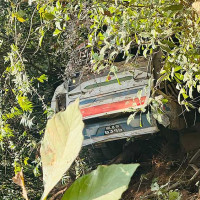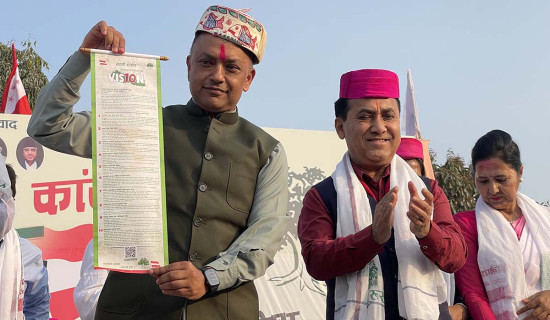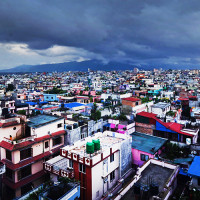- Thursday, 19 February 2026
Party Reforms, Polls Key To Nepal’s Future
A month has elapsed since the unprecedented demonstration, initiated peacefully by the Gen Z group to protest against the ban imposed on social sites by the KP Sharma Oli-led government, and rampant corruption, which later turned violent, culminating in the fall of the government and the dissolution of the House of Representatives (HoR). Even the Zoomers who staged the rally on the morning of September 8 with the two simple demands might not have expected the upheaval of that scale within 48 hours, but it ended the syndicate rules of the three parties, which were leading the government turn by turn after 2015.
The blame for the violence of September 9 solely goes to the merciless killing of 19 youths in front of the Parliament Building in New Baneshwor in the afternoon of September 8. The massacre ultimately led to the violence in Kathmandu and elsewhere on September 9, which resulted in a big loss of lives and infrastructure. In two days, 76 people were killed. Still, many injured are fighting for their lives in different hospitals.
Derailed politics
A month later, we now have an interim government led by Sushila Karki. The situation has returned to normalcy, and the government has been working to hold the election to the HoR on March 5, 2026, so that the derailed politics of the country can be brought back on the right track. On the occasion of the completion of a month of the uprising, Prime Minister Karki has appealed to the people and the political parties to accept the change. In a video message on Thursday night, she reiterated her commitment to act according to the spirit of change and hold the election. On Friday, while chairing the all-party meeting called by President Ramchandra Paudel, she also said that the election could be held only with the participation of all the political parties, and reiterated commitments to ensure the safety of leaders.
However, the CPN-UML, particularly ousted prime minister KP Sharma Oli, has been challenging the interim government and the dissolution of the House. On Thursday, while addressing his first public meeting after the upheaval, Oli not only challenged the interim government but also instructed the party cadres to take to the streets. He also said that his party would not accept the report that the commission formed under former judge of Special Court, Gauri Bahadur Karki, to investigate the killings and destruction caused would prepare. He also hinted that his party would not take part in the election and initiate a process to reinstate the HoR. What Oli and UML said on Thursday could push the country into confrontation. Such statements by Oli and members of his coteries will only increase the transition period, making the election difficult.
Likewise, a section of senior NC leaders, who were enjoying power only at the mercy of party president Sher Bahadur Deuba, are also trying to resist the winds of change. They have also said that they would move to the court against the dissolution of the House. A few leaders of the two parties seem not ready to accept the change brought about by the Gen Z group, although the revolt gave a clear message that the Nepali people could no longer tolerate the existing leadership of the big three parties—NC, UML, and Maoist Centre. Obviously, the KP Oli-led government, supported by NC's president Deuba, had prepared the ground for the demonstrations. But still, they have not realised this bitter truth and are trying to spoil the environment by making false rhetoric and floating one conspiracy theory after another. They should stop irking people, the injured Gen-Zs, and the parents who lost their children.
Fortunately, the constitution drafted by the people-elected Constituent Assembly in nine years is in place, and the interim government has been functioning under it. Holding the election on the scheduled date is essential to save the constitution and the country. Failure to hold the election could push the country into further uncertainty. But the top leaders of the big two parties have, unfortunately, been hesitating to accept the change. In this context, the CPN (Maoist Centre) has shown political maturity. It has already decided to contest the election. Its coordinator, Pushpa Kamal Dahal 'Prachanda', on Friday told the editors that a consensus was essential among the parties to make the election a success.
No matter how small the demands of the Gen Zs were, their protest has been turned into a big political event. They have pushed the powerful parties and their leaders into a defensive position. As such, the way forward now should obviously be based on the foundation of the movement. The general public and professionals have already admitted this.
Misrule
Obviously, the young people fed up with the misrule took to the streets, without fearing the bullet. Now when the youth, who lost their friends during the protest, have started demanding the arrest of Oli and then Home Minister Ramesh Lekhak for killing the children, the UML and NC leaders have started speaking against the Gen Z group and the interim government, forgetting that the Gen Z movement was stemmed from the misrule of the limited leaders of the three big parties.
Whether the leaders and their coteries agree or not, the true solution to the present crisis is the reforms in the political parties by bidding adieu to their aged leadership, and general election. If the present leadership steps down, allowing the new leaders to lead the parties and contest the election, it could be the panacea for the current political crisis. The people and even the Gen Zs also want the parties to go for a fresh poll under their new leadership. This is what the party leadership should understand to save the country and safeguard the constitution and democratic system.
(Gautam is Acting Editor-in-Chief of this daily.)



-original-thumb.jpg)











